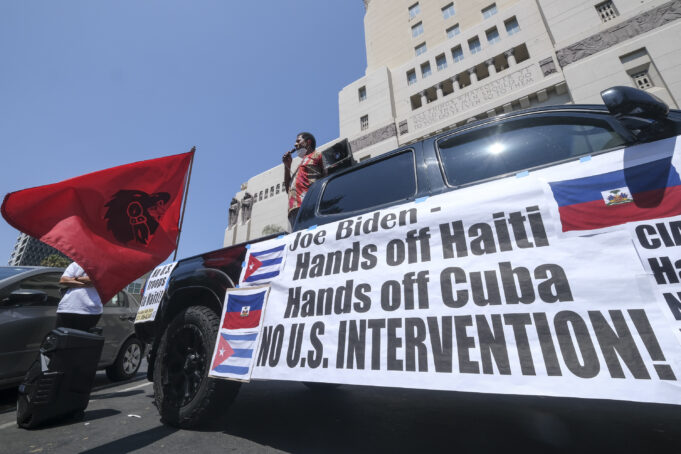WASHINGTON—Despite Joe Biden’s campaign promise to do the opposite once elected, the United States recently imposed sanctions on the Cuban police force and two of its leaders. Mr. Biden has promised Cuban-American leaders, whose votes he wants in next year’s congressional elections, more punitive actions are coming.
The Biden administration’s actions were condemned by activists who see America continuing to try to disrupt and destroy Cuba with the Treasury Department’s actions that add to already unjust, crippling U.S. sanctions.
Mr. Biden campaigned on a promise to “go back” to more normal relations with Cuba following President Donald Trump’s openly hostile policies towards Havana. Mr. Biden has failed to keep that promise.
Most governments in the world, including virtually all major U.S. partners, have long opposed the half-century-old U.S. economic embargo against Cuba.
“U.S. sanctions by President Trump blocked remittances of $3.5 billion annually, and the pandemic has closed the tourism industry,” William LeoGrande, an American University government professor who specializes in U.S. foreign policy toward Latin America said according to a Reuters news report. “As a result, the government doesn’t have the foreign exchange currency it needs to import food and medicine, which are now in short supply. On top of these hardships, the pandemic has broken out into community spread, stretching the ability of the heath care system to cope.”
Mr. Biden could resume the Obama administration’s policy of engagement tomorrow if he wanted to, said Mr. LeoGrande. “All the sanctions Trump imposed were by executive authority and could be reversed the same way,” he continued. “The main challenge is whether or not he has the political will to do it.”
The political will in this country is to continue to punish Cuba and a handful of other Latin American countries which resist U.S. domination. “I refer to Cuba, Nicaragua, and Venezuela. And then also you can even maybe put Bolivia in there as the Latin American ‘Axis of De-Colonization,’ ” Netfa Freeman, an activist with the Black Alliance for Peace told The Final Call. The United States opposes these countries “because they’re afraid of the example” of their survival in the face of brutal U.S. sanctions.
“If we just study the U.S. intervention in Cuba, it’s really a case study of U.S. diversion. They employ these tactics and even more than propaganda. As far back as 1960, there’s declassified documents from the National Security Agency that talk about their need to foster an internal dissent against the Cuban government because it was so popular.
“And then they continue the same line and the same programming intent all the way through the 60s and 70s, up until now,” Mr. Freeman spoke by telephone from the Nicaraguan capital city of Managua, after a week-long tour of the country as part of the 42nd anniversary of the victory of the Sandinista Party in national elections there.
The U.S. Agency for International Development and other organizations like the National Endowment for Democracy and Freedom House are part of what’s known as a Cuban program.
“If you look at what’s happening right now, today, and just a few years ago, I think, 2014, it was exposed. We have short memories. The U.S. Agency for International Development was exposed for creating a Twitter type of a social media.
“And it was specifically designed to sway people away from Cubans,” Mr. Freeman continued, “away from supporting the Cuban revolution.” And, he said, for a long time these U.S. organizations have concentrated on trying to turn Cubans against their government’s reactions to pressure and plots from the U.S.
During the 2020 presidential campaign, Mr. Biden told CBS Miami’s Jim DeFede that he would restore President Barack Obama’s policies that granted Americans unrestricted rights to visit family and send money to Cuba.
On Cuba, the U.S. is virtually alone and wrong in its hostility. The UN General Assembly June 23 voted 184 to 2—only the United States and Israel objected—for the 29th consecutive year (except during 2020 no-vote pandemic) that the lopsided tally has occurred to demand an end to the U.S. economic blockade.













